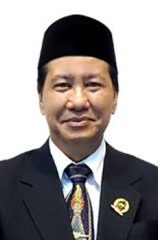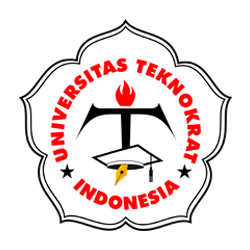In conversation with
Dr. H. M. Nasrullah Yusuf, S.E., M.B.A.
Rector | Universitas Teknokrat Indonesia

ASEAN Education Spotlight: To the readers of Newsweek, do you think that now is the right time to shine the spotlight on Indonesian higher education?
Dr. HM. Nasrullah Yusuf: Yes, I do believe that it is a good time now. Indonesia is still in transition of democracy and therefore it is the best time to get to know Indonesia; we are changing.
From some of the discussions I have had with friends and colleagues on the growth of the ASEAN economy, it is clear that many believe that Indonesia is growing while the other neighbouring countries are stagnating.
These countries pay attention to Indonesia because they see that the government here is working hard to make the country and its economic growth the centre of discussion for the next five years.
What was the inspiration to open the institution and what was your personal drive behind it?
Dr. HM. Nasrullah Yusuf: On a personal level, it seemed like the flow of the water in the river, so to speak.
Education has always been part of my life; I started working in the education system from a young age, and it just seemed like the natural progression. I also had an opportunity to set up a different kind of university, one that addressing the education needs of the worker. Many agricultural workers, for example, have children who need to be educated not only on an academic level, but trained in terms of the skills needed by industry.
That is what the main drive behind Universitas Teknokrat Indonesia was – to try and fill a need that was not being filled by other main universities across Indonesia. We have, for example, seen in the industrial, trade and space areas especially that graduates need to be trained and prepared better for working with computers.
What were some of the biggest challenges when setting up the university and did you imagine, at that time, that it would be what it is today?
Dr. HM. Nasrullah Yusuf: The biggest challenge was, and I suppose still is, the element of human resources that we needed and still need today, especially in terms of lecturers.
The government requires lecturers to have a Master’s Degree when you want to be a lecturer. However, the challenge with this is that you not only have to firstly send the people off to get their degrees, but at the time we were setting up the university there was no such thing as a Master’s Program in Computer Science or English Language in available in Lampung. This meant that we had to spend more budget to send the lecturers to study in Java or overseas and even though the lecturers came back with the theoretical knowledge, we had to train them to be able to transfer the knowledge to the students well.
We had to train them on micro-teaching, which is not easy. It is not always to apply what they had learned in such a way that the students pick it up easily. We implemented camera control in order to watch them and see what they are doing and, more importantly, how they are doing everything from the way they speak to the students to how quickly they speak to the students. This make us able to evaluate the lecturers’ performance and know how to improve them.
What have you identified as the key steps for the future development of the university?
Dr. HM. Nasrullah Yusuf: The most important step we have to take is to find out what skills and knowledge industry needs from graduates. We need to make our curriculum fit with that.
We would also like to teach other universities how to prepare their students for the future, because generally our graduates get jobs easily compared to others. Our hope is that our alumni have a competitive advantage when they look for work after graduation.
In the next five years we would also like to become more of a research university. For this, we need our teachers to improve their capacity, education and skills.
What are some of the flagship projects you are launching in order to pursue becoming a research university?
Dr. HM. Nasrullah Yusuf: We give our students who qualify, leadership and managerial training. As mentioned, we prepare our graduates very well for after graduation and part of that is preparing them to be leaders.
Part of this is preparing them to discuss politics, and build and train people themselves, and us doing research in order to do so as well.
With regards to the future research you would like to conduct, what are some of the areas you would like to address here in Lampung in the local community?
Dr. HM. Nasrullah Yusuf: The agriculture base here is something we would like to address through our students.
Some of the processes, especially when it comes to rice farming, need to be addressed. We would like what we do in terms of science and technology to support the research we conduct to help the agriculture industry. Currently, we are funding the research and the work ourselves.
Our plan is to leave a strategy on how to build, manage and market a business for the younger generations, no matter the industry you are in. We want to continue training students from every angle, not just from marketing a business, but also from the get go so that they are able to identify the gaps in the market, especially in agriculture as Indonesia and Lampung is heavily focused on that.
What opportunities in terms of internationalisation and partnerships with universities and companies has the formation of ASEAN brought to you and the university?
Dr. HM. Nasrullah Yusuf: When you look at the bigger picture, you see that the businesses in Indonesia have the opportunity to partner with international businesses.
On the education side of things, we have the ability to partner with local and international universities and we have the opportunity to learn from other educational institutions. This is something that I believe is very important, as it is the best way to move forward and become better.
Personally I want to create better partnerships in Malaysia and the United States. I have former colleagues and fellow students who are now my friends, so those partnerships are very potential in the near future.
However, the English language still remains somewhat of a barrier, so that is something we would have to look at.
How, according to you, would the university be and what would you want it to look like in the next 10 years?
Dr. HM. Nasrullah Yusuf: I am planning to set up a new building for the students, which I hope will be accomplished in the next three years. I love the current European style architecture we have on campus, and I would like to keep to that when making the campus bigger.
I have travelled a lot myself, and the whole university is evidence of where I have been and the places I love. The new building will be built with the aim to not only be there for the students, but to possibly be a destination for tourists to visit when they come to Indonesia.
While our students have a competitive advantage, we would like to increase that with our graduates in the years coming.
What do you believe is the role of your university in creating awareness for areas such as Lampung and its educational institutions?
Dr. HM. Nasrullah Yusuf: I believe that, firstly, we need to improve the quality of our education. One way to do this is to increase the creativity in students and place a focus on everything IT and within the cyber field.
We also have a responsibility to the ASEAN community to continually improve, innovate and to be the best that we can be.
How do you, both professionally and personally, promote lifelong learning and improvement of education to your students and to the community around you?
Dr. HM. Nasrullah Yusuf: I try to encourage my students to study and learn not only on campus, but within and from society as well. Just as your education improves, your social quotient and emotional quotient need to improve.”
